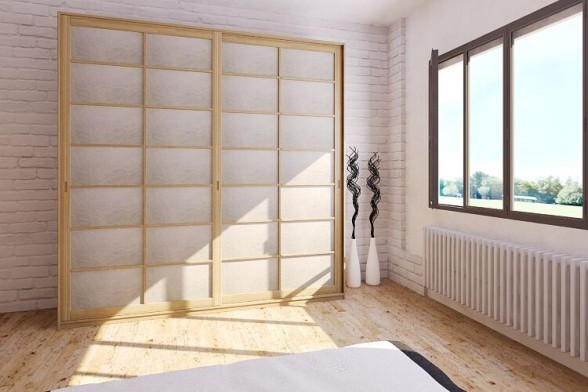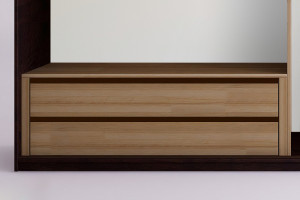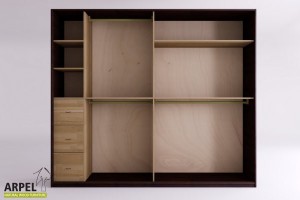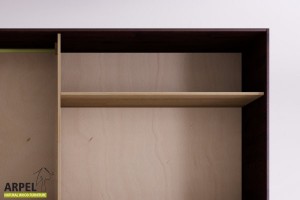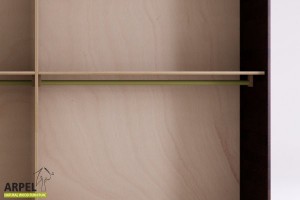No products
Shoji Wardrobe 8'2" with Rice Paper Sliding Doors
New product
The Shoji wardrobe in Japanese style is made of solid, lamellar beechwood. The two Shoji sliding doors combine traditional Japanese minimalism with modern technology. With our wide range of sizes, wood finishes, rice papers and interior fittings you can design your own personalized wardrobe. For a customized wardrobe ask for a price quote.
Product Options
Couldn't find the dimensions you need?
Ask for a custom made productMore info
Product features
The Shoji wardrobe with two sliding doors fully complies with Japanese minimalistic interior design. Made of natural solid wood this wardrobe is environment-friendly, long-lasting and elegant.
We offer five different sliding systems for the Shoji doors:
1. the traditional Japanese wood-on-wood system with sliding doors on wooden rails;
2. sliding doors with integrated wheels which glide on wooden rails;
3. a modern sliding system on metal fixed to the base of the wardrobe, and doors on height-adjustable wheels.
4. a modern sliding system on metal runners fixed at the top of the wardrobe if you desire hanging doors.
5. a modern sliding door system on metal runners with a soft closing system for gentle closing of the door. In this case therunners are fixed at the top of the wardrobe
For more information about our sliding systems visit our Sliding systems for Japanese sliding doors page.
In addition to the plain version of the door, that is the design without a grip, you can choose to have simple integrated handles or handles design Quattro with a colored panel.
Door covering
For the Shoji doors rice paper covering we offer different options:
1. Plasticized rice paper. This means that the rice paper is covered with a layer of plastic (PVC) on each side. This type of covering is semiwashable and can be cleaned with a damp cloth and water.
2. White fiber rice paper glued to a polycarbonate panel and then vitrified. For this type of covering the rice paper is first moistened and glued onto a 1mm thick supporting layer of transparent polycarbonate, then it is uniformly sprayed with a water-based vitrifying liquid for further protection. This technique increases the stability while mantaining natural, slightly creased consistency of the rice paper. With this type of treatment, the Shoji doors become perfectly resistent to shock and pressure, which can occur due to a frequent opening and closing of the wardrobe.
3. Plastified rice paper reinforced with a polycarbonate panel. A transparent plastic panel will be put behind the rice paper, glueing is not necessary.
For more information about our rice papers and their treatments, visit the rice paper page.
If you prefer a fabric covering for the Shoji doors of your wardrobe, take a look at the Shoji wardrobe 250 cm with fabric covering.
If you wish, the doors can also be covered with whitened beech panels. Please ask for an estimate of cost if you are interested in this option.
Wood finish
The Shoji wardrobe with sliding doors is available in natural untreated wood, in addition we also offer models with external panels and doors treated with water-based ecologic finish in different colors. Choose the oil finish if you prefer a transparent finish. Whatever finish you choose, we recommend to opt for an oil finish for the interior as it is lighter than the other colors and allows a better visibility inside the wardrobe.
For more information about our wood finish treatments visit our finishings page.
Types of wood and thickness of panels
Wardrobe exterior: solid 19 or 26 mm thick lamellar beechwood
Wardrobe interior: solid 19 mm thick lamellar beechwood
Doors: solid 19 mm thick lamellar beechwood. The 26 mm thickness is only available for doors with an upper sliding system (type 4 and 5)
Drawers: lamellar birch with beech fronts.
Measures
Width: variable between 240 and 250 cm
Height: variable from 230 to 270 cm (in steps of 5 cm)
Depth: 60 cm
For more measures or depths, ask for a price quote.
Door type
Door type Shoji with Japanese style grid. In order to ensure the highest stability possible, the number of bars could possibly be increased by one or at the most two elements, if the wardrobe is higher than 250 cm and certain coverings like plasticized rice paper without support are used.
Wardrobe interior
The wardrobe has a small pedestal with leveling feet. The standard interior structure consists of a central divider, 2 adjustable shelves and 2 hanger rails. You can choose additonal shelves, drawers and modules in accessories at the bottom of this page. For customized orders ask for a price quote.
Assembly
You will need a crosshead screwdriver to assemble the exterior and interior of the wardrobe body, a cordless screwdriver for the rear panel. If you are looking for a fitter near your city, you can use this form for contact.
Care and maintenance
When cleaning treated wood use a damp sponge, without solvents or cleaning agents. Untreated wood may only be vacuumed or dusted. Textils may be vacuumed, rice paper coverings cleaned with a damp sponge.
Accessories
In the accessories section you'll find additional drawers, moduls, shelves and hanger rails to complete your wardrobe.
Accessories
Chest of Drawers ...
437,88 €Internal Element ...
186,96 €Additional Shelf ...
90,63 €Additional Hanger...
29,07 €Related articles on blog
No related articles on blog


